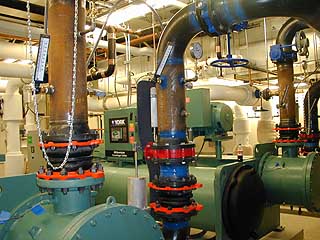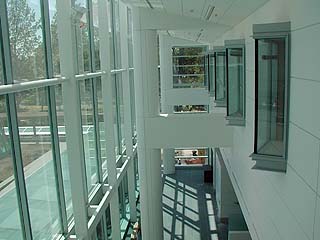|
Subscribe / Renew |
|
|
Contact Us |
|
| ► Subscribe to our Free Weekly Newsletter | |
| home | Welcome, sign in or click here to subscribe. | login |
Architecture & Engineering
| |
 |
July 24, 2003
Gates Hall gets a test drive
Lease Crutcher Lewis

Photo courtesy of Lease Crutcher Lewis
Complicated systems such as the chiller plant, shown here, require testing to identify and correct problems early. Surveys show buildings that undergo such testing use 30 percent less energy.
|
With William H. Gates Hall, most people’s first impressions will be based on what can be seen — a landmark addition to the University of Washington, and an excellent new learning environment. Other judgments will come later, based upon the how the building “feels” and how efficient it is to manage and operate.
Commissioning is the process of testing, troubleshooting and calibrating the building’s functional systems to make sure they all work properly — everything from air temperature to data hookups to emergency power.
Even the best-designed and most well-constructed building must be commissioned effectively. It simply isn’t possible to predict every real-world dynamic, and not all equipment works perfectly the first time. Commissioning is about identifying and correcting problems as early as possible.
How’s the temperature in the soaring glassed-in entry lobby on a cold winter day or during the summer? Are the chillers using energy as efficiently as possible? Do the air-handling units stay on, as they should, when the fire alarm system is tested? And how about the elevators?
Here in late July, testing is in full swing, with all systems online and the School of Law moving into the building over the summer. Yet the commissioning process began early during construction.
GC/CM
The general contractor/construction manager (GC/CM) procurement method enables public entities in Washington to bring the contractor onto the team early in the building-design process.
This is helpful for commissioning because the test engineer and other members of the contractor team can bring insights that impact the design.
“That is key to a smooth commissioning process, and has really improved the outcome on this building.” says Bill Lewis, president and CEO of Lease Crutcher Lewis, the GC/CM for Gates Hall.
GC/CM also allows the contractor to take the lead alongside the design team in coordinating between the various mechanical, electrical and plumbing systems, fitting the pieces into the building, and laying out the systems to be accessible during commissioning and throughout the building’s life.
Solving problems

Photo courtesy of Lease Crutcher Lewis
Glass walls, skylights and multilevel spaces add complexity to a building’s air systems. The commissioning team must sometimes find creative ways to test the systems to make certain they’re running properly. |
For Gates Hall, members of the project team came up with many ideas for analysis, and some were adopted. For example, the team chose to connect Gates Hall to the campus’ emergency power in lieu of installing a diesel generator set because of aesthetics and schedule concerns. And the decision to use return air plenums instead of ducting helped save money and energy.
The team’s flexibility is crucial because plans always become fluid once testing begins, since the commissioning process is about finding and solving problems. A test scheduled for a given day might not be possible because a related system is being fixed or recalibrated as the result of a previous test. So the team will pick other tests for that day.
More than 30 weekly commissioning meetings will have been held by the time the school opens this fall, each involving the university, Mahlum Architects, Lewis, JCI, Air Test Co. and others.
“Communication is key, and the time investment pays off,” says Tony Johnson, the project manager for Lewis. “We talk about schedule and whether any issues have come up. Then we get to resolve things with all the players in the room.”
This is especially important due to the interconnectedness of the systems — for example, an alteration to the HVAC system will impact electricity usage.
A specific process was developed for commissioning, full of check-lists, scheduled sign-offs and accountability measures. But the commissioning process is really dependent upon creativity and cooperation, both in finding meaningful ways to test systems, and finding solutions when necessary.
|
A work in progress
At the moment, things are clearly “in progress.”
The space above the ceiling tiles, for example, serves as a return air plenum, and the occasional tile still rises and falls due to the pressure differentials. Building pressurization systems are harder to test and calibrate because of the sensitivity required. But the system will be calibrated and fully operational before occupancy, and that’s the point.
Environmental sustainability is a key reason to intensively commission a building. Surveys show that a commissioned building will use 30 percent less energy on average than one not commissioned.
Systems that are calibrated properly will always run more efficiently and use less energy. The law school has systems designed to reduce energy use, such as the outside air economizer.
When cooling is needed, this system tests the temperature of outside air, then decides whether simply to use that air or start the chiller. This significantly reduces the usage of the chiller, but only if the system is properly calibrated.
We’re proud of Gates Hall. An effective commissioning process will help ensure that the UW’s students, faculty, and staff will be proud of Gates Hall as well.
Steve Eirschele is director of mechanical, electrical and plumbing engineering at Lease Crutcher Lewis. He has focused on mechanical and electrical systems as a general contractor, designer, owner and consultant, with a special focus on university and biotech facilities.
Other Stories:


